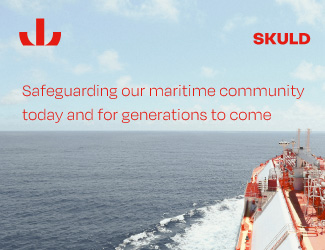Decarbonization is probably the greatest challenge humanity has ever faced. No shipping company, not even the maritime industry as a whole can succeed without a broad collaboration of shipowners, managers, fuel suppliers, financers and customers
Currently, 25 % of newbuild orders set to be fueled by alternative low or zero emission fuels.[ds_preview] »It is a good start, but we now need to accelerate that. And we need a solid safety foundation, especially when it comes to new fuels that are so far immature in shipping, such as hydrogen and ammonia,« said Knut Ørbeck-Nilssen, CEO of DNV – Maritime recently at a DNV-organized expert conference on the future of maritime fuels. »This is where class societies haven an essential role to play – working with owners operators, regulators, shipyards and a diverse range of stakeholders to insure we can face an uncertain future with confidence.«

The challenge that decarbonization and thus the development of new fuels poses is highly complex. Classification society DNV sees collaboration as the only way to drive the maritime industry towards a truly sustainable future, said Ørbeck-Nilssen, meaning »stakeholders coming together across industries, segments, disciplines and borders with a commitment to a common purpose. A commitment to solving the greatest challenge of our time: decarbonization. This is a task, that not one player, not even one industry can approach in isolation. You can’t do it alone and shipping can’t do it alone,« he said. Ørbeck-Nilssen compares it to a rescue operation at sea: »Everybody has to lean in. The future is uncertain, but our objective is not. It is not a competition or a race, it is a rescue operation.«

Søren Toft, CEO at major container liner company MSC agreed: »It really requires collaboration and coordination rather than individual leadership. We probably need to see both,« he said, adding that »tackling climate change is not a nice-to-have, it is an essential and a license to operate in the future.«
Toft believes that shipping must and can decarbonize fully by 2050. »Given that the economic live of a ship is typically more than 20 years, obviously we also need to start acting now, because we cannot be in a situation where suddenly all our assets are obsolete,« he said.
Martha Lamp Sandvik, VP Ocean Industries at DNB bank, a partner of the Norwegian green shipping programme, observes a change in the way companies work in their effort to decarbonize as they have to rely on collaboration: »The industry is going from internal innovation to open innovation, that is incredibly positive.« She pointed out the advantages of being a partner in collaborative innovation projects: »You get to discuss risks and thoughts on a much earlier stage than you would if a project would be developed internally. It is risk reducing, it is cost efficient and it is a great way of testing thoughts and solutions.«

Still, »future fuels« are – future, with only a few alternatives already available while shipping volumes grow and emissions across the industry are increasing. »What we are trying to do right now is to make sure that emissions are decreasing relative per TEU or ton carried. That will not reduce the emissions in absolute terms. So, we must continue to do our part to mitigate the impact of climate change while we continue to operate responsibly meeting the increasing demand for global trade,« Toft said. MSC has reduced its relative CO2 emissions by more than 44 % since 2008. »Improving the efficiency of our fleet will remain a key element of our strategy going forward. We are not saying: it is now net-zero fuels or nothing. No. For a number of years to come, continuing energy efficiency will still be very important.«
Action over perfect solutions
»I just want to make the very clear statement: Yes, we need to develop future fuels that are net-zero. But we have to, in parallel, continue on the energy efficiency measures, because the ships we have today will continue to be in operation for years to come,« Toft was convinced.
The company recently deployed air lubrication systems to about 30 newbuildings, that promise to cut 1.6 mill. t of carbon over the lifecycle of the ships altogether. MSC’s efforts also include an increased use of digital route planning, exchange with customers as well as regular robotic hull cleaning. In its fleet and order book the carrier tries to keep flexibility and make sure that the ships are ready for the future fuels.
»We are studying different options including ammonia, methanol and hydrogen. The reality is that it may take years, maybe even a decade before we can propel the whole fleet with carbon neutral fuels. We are, at this point, not ruling out any option that will help us to decarbonize,« Toft stated. LNG will be an important transition fuel, he believes, be it in the form of »traditional LNG«, Bio-LNG or synthetic LNG.
DNB manager Sandvik sees the bank as a »transition bank«. »Financers cannot exclusively focus on green solutions, they also have to finance the transition. There is a lot of emission reduction potential in companies that cannot be classified as »green« under the EU taxonomy today. Sustainable finance has to be inclusive,« she said.
While sustainable finance comes with larger reporting requirements, small and medium sized enterprises often do not have the administrative resources to report to a large number of partners they are working with on their transition to a greener operation. »It is important to maintain a balance between maintaining the integrity of a product and maintaining the data and reporting quality and at the same time making it accessible to companies of various sizes,« Sandvik said.
She sees the Poseidon Principles’ rules, that a growing group of banks and shipping investors use to classify an investment as sustainable and green, as a »great example of prioritizing actions over perfect solutions«. »The Principles are dynamic and changing with the market. That is important and better than constantly searching for the perfect solution. It is about pushing from different angles so the industry moves in the right direction«, the banker stated.
Andy Dacy, Global Head of Transportation at JP Morgan, also observed that it is becoming difficult to bring forward an investment project that does not include ESG aspects. However, he added that »the Poseidon Principles are great, but the difference between being Poseidon-compliant and not so far has not really materialized in savings from a borrowing perspective.« Banks would have charge a lot more for a ship that does not meet the emission requirements and pass on those benefits to companies that do, he said.

Bigger impact will come the chartering side, Dacy was convinced. »Charterers’ decisions for lower emission vessels will lead to the phasing out of older tonnage. From an economical perspective there are choices being made that will move us forward as an industry.« What would really push the industry efforts, in Dacy’s view, would be »the Amazons and Walmarts« participating in the decarbonization process of the shipping sector.
Ship finance as driving force
Nevertheless, today, more than half of ship finance can be traced back to Poseidon Principles signatory banks, raising the question if we will reach a point where green finance is as effective as regulation to incentivize decarbonization in the shipping industry. Sandvik stated: »The market cannot do it by itself. We need effective regulation to solve the underlying market failures and externalities and principle issues that come with climate change.«
MSC’s Toft also thinks that it is critical that policy makers »catch up«. »The ball is in the court of the policy makers to rapidly provide a more robust global framework to incentivize this transition,« he said. »It seems a bit daunting, but there is no doubt that in the container shipping industry, as I observe it, we are fully committed to decarbonization. Public commitments have been made, sending a united signal to policy makers that we and our partners are in fact helping the transition to more sustainable way of facilitating international commerce,« Toft said.
Lynn Loo, CEO of the Global Center for Maritime Decarbonization, also emphasized that the industry is demanding top-down regulation to provide some guidance.

»With total cost of decarbonization for shipping estimated in the trillions we are currently making significant and very expensive capital decisions that will live for decades to come. This means that when we change the fuel source for a ship, it is a decision that is going to last maybe 25 or 30 years. We need a better understanding of what the future fuels will be and make sure that the additional cost will be passed on to the consumers,« said Toft. »The transition comes at a cost, we cannot neglect that. A cost, we all have to share.«
Today, green fuels are priced at around three to four times the cost of conventional fuel. As availability increases, the cost will come down, but they will very likely will be much more expensive than the fuels of today. Toft thinks that the fuel cost will likely double compared to today, adding »a few hundred dollars for each TEU carried«.
Lynn Loo foresees a diverse future of marine fuel. »We will have to have a lot of different infrastructure in the ports in the future,« she said and also addressed the issue of different standards for new fuel types such as biofuels. »To justify premiums, fuel suppliers should provide transparency across the supply chain, so customers know what they are buying.«
Sandvik sees availability of the future fuels as one of the biggest hurdles to decarbonization. »This will take a much longer time than getting the technology in place,« she said, adding that »we need industry signals being sent from those collaboration projects to fuel producers to incentivize the production of new fuels.« fs
















